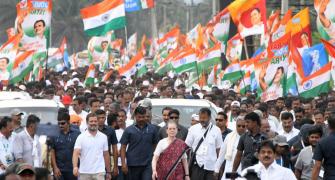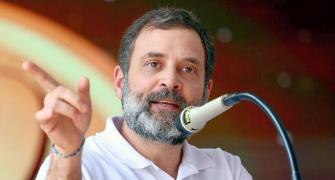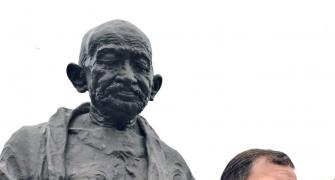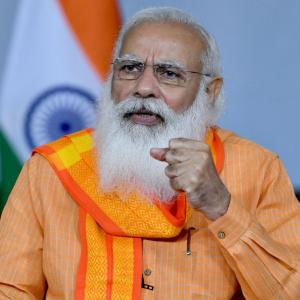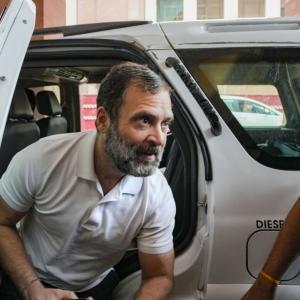Anti-Congress regional parties may have felt the possible impact of Rahul's South-North yatra, pending a second East-West padayatra, observes N Sathiya Moorthy.
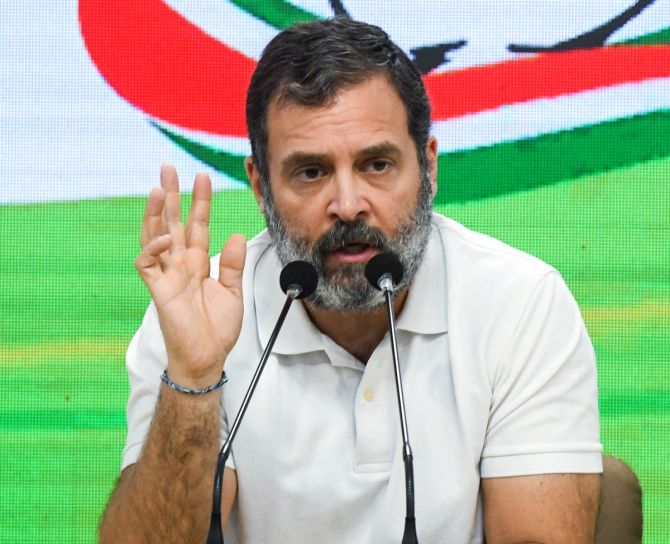
It may not mean much, but on Rahul Gandhi's disqualification as Lok Sabha member following a Surat court verdict in Prime Minister Narendra Modi's native Gujarat, all Opposition parties are on the same page in criticising as never before the Bharatiya Janata Party ruling the Centre.
On the politico-legal side, the Rahul case may have given a new impetus to state governments fast-tracking pending and new criminal cases of the kind against the Opposition legislators, and get them disqualified as MLAs or MLCs.
In turn, this could lead to a proverbial situation in which an-eye-for-an-eye could turn them all blind, and even before the Lok Sabha polls next year.
Whatever BJP spokespersons may say in their political defence, the legality of the Surat court verdict and the inevitability of the Lok Sabha notification on Rahul's disqualification, they cannot influence street opinion that the party may have taken the threat seriously after his nationwide Bharat Jodo Yatra, especially in North India.
More than the by-election that may become due in Rahul's Wayanad constituency in Kerala, which the Election Commission may be prompt in scheduling, his possible imprisonment may deny his party a campaign face ahead of the coming assembly elections in Karnataka, where the ruling BJP's chances are not said to be too bright, owing to corruption charges, yes, and other aspects of inevitable anti-incumbency.
If this is the purported reason for Rahul's effective disqualification for eight long years and from campaigning for all elections, including the Lok Sabha polls and a host of assembly polls, earlier and later, as Congress cadres (wherever they are left), then that raises questions about the BJP's past branding of him as 'Pappu'.
Almost every other BJP leader from top to bottom and their IT wing has defamed every Nehru-Gandhi, and there may be courts in the country that could find substance if a criminal defamation petition is moved now, even with retrospective effect in some cases.
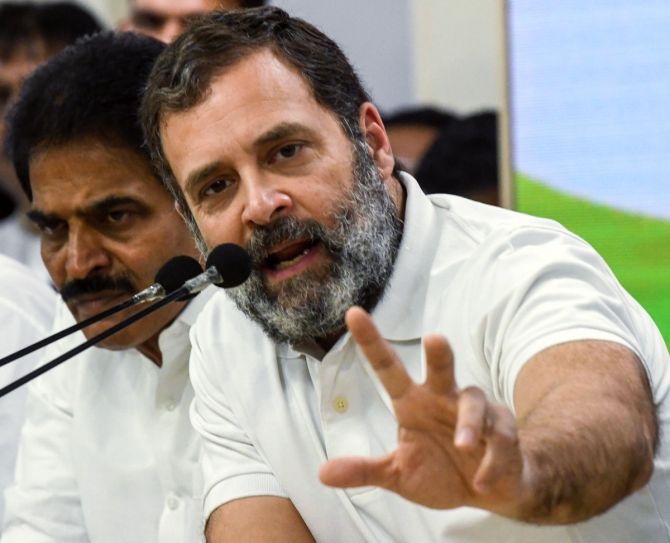
It is true that in the Lily Thomas case (2005), the Supreme Court had rendered ineffective relevant provisions of the Representation of the People Act that protected convicted persons with a jail term exceeding two years, to continue as a legislator until the final disposal of their appeals (first in the sessions court, then the high court, and all the way up to the Supreme Court, which under Indian conditions could take years, if not decades).
Where it is a three-year jail term, even the appeal plea has to be filed in the high court, but it also cuts down one stage, that of the sessions court, in the process.
But even before Lily Thomas, the Supreme Court had held that the acceptance of AIADMK leader J Jayalalithaa's nominations to contest the Tamil Nadu assembly elections in 2001 (from four constituencies, all of which she won, and which did not make any difference to the law), pending her conviction in the TANSI land deal case was ab initio void.
The Supreme Court held that the bail sanctioned by the Madras high court applied only to the sentence part, and the conviction remained unaltered until the final disposal of the case.
It is another matter that the Supreme Court itself later acquitted Jayalalithaa in the case, based on an unprecedented 'plea-bargain', after her defence team made the unique offer to return government property that too caused without any consideration.
Eyebrows were further caused to be raised as this offer was made only in the closing arguments, which gave the respondents no scope to contest the submissions or argue their part.
Even Lily Thomas did not seem to have made any adversarial reference to what seemed to be a patent anomaly, especially when acquittal based on property-surrender for Jaya was never ever followed in such other cases.
Yet, all of it means that even if the higher courts grant Rahul Gandhi bail in the Surat case, it would not remove the conviction part.
Hence, the Lok Sabha notification declaring his seat vacant is in order though the haste could not be explained, as if the Indian system was cued to fast-track all matters.
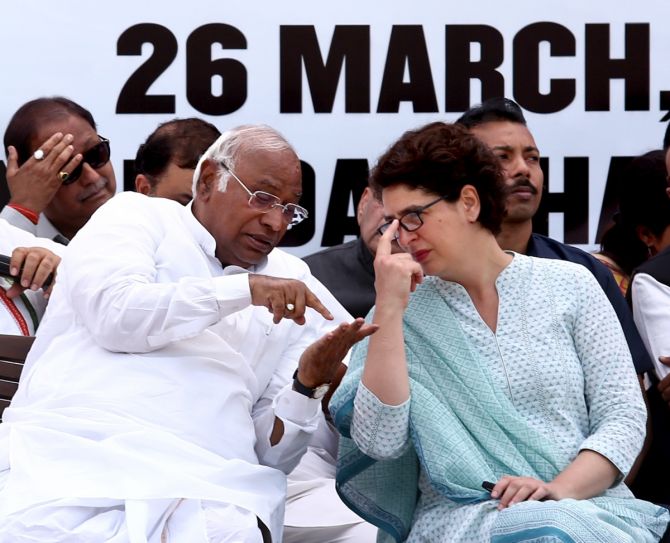
Even in Jaya's case, where she had to bow out as chief minister and O Panneerselvam stepped in, in the first of three occasions, the state assembly secretariat issued the notification only after they as also the Election Commission were suitably embarrassed after what the political Opposition dubbed as 'motivated delay'.
But a lot will depend on how the sessions court in Surat, or the Gujarat high court and/or the Supreme Court view the matter.
Is the Supreme Court especially going to abide by precedents, or is it going to reopen and review the very question of granting time for convicted legislators to continue in office until the final disposal of the case?
While past verdicts were pro-active from the perspective of promoting cleanliness in public life, it also denies the individual his or her right to continue as the elected representative of the people who had voted them in.
Jayalalithaa's case is again a pointer. What if after the Supreme Court had acquitted her in the TANSI case (as different from the later-day disproportionate assets case), she did not have a member willing to vacate his seat voluntarily for her to contest, win and re-enter the assembly, under totally different circumstances than earlier?
As may be recalled, Jayalalithaa-led AIADMK's S Thanga Tamizh Selvan quit his Andipatti seat for her to contest, win and re-enter the assembly and return as chief minister in 2022.
Who can guarantee Rahul Gandhi such an opportunity if the Election Commission fills up the Wayanad vacancy through a by-election now, and he is acquitted on appeal, say for instance, before the Lok Sabha poll next year?
Could it mean that on a possible plea from his side or by a voter in Wayanad, the Supreme Court could direct the Election Commission to hold the Wayanad vacancy in abeyance until the final disposal of the criminal matter?
Can the relevant court then direct the Lok Sabha secretariat to withdraw the vacancy notification that it has issued now?
Or, should the secretariat keep altering the status of the notification, pending Election Commission scheduling the poll, if the sessions court and/or the high court reverses the Surat verdict?
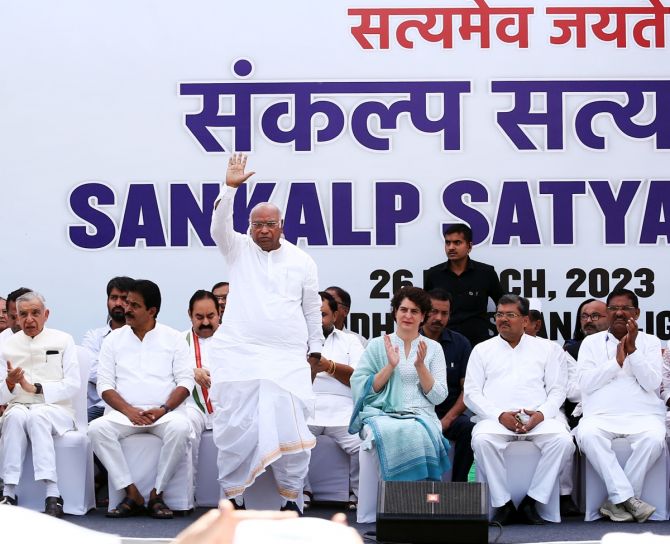
Politically, Mamata Banerjee, Arvind Kejriwal and Akhilesh Yadav joining the Opposition bandwagon to condemn Rahul's overnight disqualification does not mean that they would automatically join a joint/common platform to take on the BJP and the Modi leadership, in particular, in electoral terms.
Even the 14-party Supreme Court petition, alleging misuse of the CBI, IT and ED, does not have the Congress as a signatory.
Possibly, some of the regional parties did not want it, and possibly the Congress decided a strong political message should go out than insisting on its participation.
It can, after all, file a separate petition for being heard in the case, when the Supreme Court takes up the matter on April 5.
Incidentally, the DMK, an ally of the Congress, is not a 'victim' of the Centre's financial crime investigation units, and yet the party is a signatory to the petition.
The joint condemnation of Rahul's disqualification -- some have criticised even the court case -- may be a reflection on the public mood in their respective states that has forced these anti-Congress regional parties to react in the way they did, based on the understanding that the BJP may feel vulnerable after all.
They too might have felt the possible impact of Rahul's South-North yatra, pending a second East-West padayatra, and may have felt that Rahul, if not the Congress without him, could become central to all anti-BJP politics in the year-long run-up to the Lok Sabha polls.
There is something that Mamata may recall from her younger days in the parent Congress party, but Kerjiwal and Akhilesh may have got to know only from hearsay. But as a young RSS pracharak and the Jan Sangh's student leader in native Gujarat, Modi may recall the way public pressure forced multiple Opposition parties to float the Navnirman Andolan against the ruling Congress, with 140 out of 168 MLAs, culminating in an ageing Morarji Desai staging an indefinite fast and forcing then prime minister Indira Gandhi's government to dissolve the state assembly and order snap polls that the ruling party lost.
That was in 1975. On the same day, June 12, the Allahabad high court unseated Indira Gandhi as MP from Rae Bareli.
Less than a fortnight later, on the night of June 25, the Congress-led Centre promulgated a state of Emergency (even before then President Fakruddin Ali Ahmed had affixed his signature and seal).
That was again after the Opposition had joined hands to demand Indira Gandhi's resignation, at the historic Ramlila ground rally hours earlier.
The unity continued until after the end of the Emergency in 1977, and the conduct of the delayed Lok Sabha polls, which the public mood forced the Opposition to contest together -- and win together, under a new name and title, the Janata Party.
The rest, as they say, is history. It's the story of the infighting in and downfall of the Janata Party and the return, in 1980, of the Congress under Indira Gandhi.
N Sathiya Moorthy, veteran journalist and author, is a Chennai-based policy analyst and political commentator.
Feature Presentation: Rajesh Alva/Rediff.com

